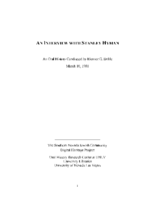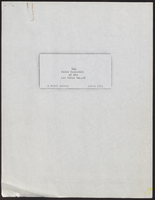Search the Special Collections and Archives Portal
Search Results

Transcript of interview with Bob Campagna by Kathleen Neumann, March 17, 1978
Date
Archival Collection
Description
Text

Transcript of interview with Lilly Fong by Annie Yuk-Siu Shum, February 29, 1980
Date
Archival Collection
Description
Text

Transcript of interview with William E. "Bilbo" Helms by Denise Wolff, March 4, 1980
Date
Archival Collection
Description
On March 4, 1980, collector Denise Wolff interviewed truck driver and teacher, William E. “Bilbo” Helms (born on December 7th, 1932 in Memphis, Tennessee) in an office room at Bonanza High School in Las Vegas, Nevada. This interview covers the transformation, growth, and development of the public education system in Las Vegas, Nevada.
Text

Transcript of interview with Neil H. Holmes by Laura Bell, February 12, 1975
Date
Archival Collection
Description
On February 12, 1975, collector Laura Bell interviewed her neighbor, plant mechanic foreman, Neil H. Holmes (born on November 16th, 1897 in Chicopee, Kansas) in the collector’s home in Boulder City, Nevada. This interview covers the construction of Boulder (Hoover) Dam. During this interview Neil also discusses local living conditions in 1931.
Text

Transcript of interview with Stanley Hyman by Eleanor Doble, March 10, 1981
Date
Archival Collection
Description
Interview with Stanley Hyman by Eleanor Doble on March 10, 1981. In this interview, Hyman discusses his job as a district manager for Farmers Insurance group, which brought him to Reno, Nevada in the 1940s, then to Las Vegas in 1951. He talks about the population growth of Las Vegas, and comments that the infrastructure of the city did not improve with the population growth. He also talks about some local disasters, the economy, entertainment, and the convention business in the area. He speaks briefly about recreation at Lake Mead and Mount Charleston, and atomic tests. The interviewer asks about women in leadership positions in hotels and in the insurance business.
Text

The water resources of the Las Vegas Valley: a brief survey, March 27, 1931
Date
Archival Collection
Description
Overview of the water resources in the Las Vegas Valley, includes maps
Text

Transcript of interview with Flora Hannig-Kellar by Michael Taylor, March 27, 1981
Date
Archival Collection
Description
On March 27th, 1981, collector Michael D. Taylor interviewed housewife Flora Hannig-Kellar (born January 24th, 1902 in Washington, Utah) in Henderson, Nevada. This interview is Flora Hannig-Kellar’s personal account on growing up in Nevada. She discusses home and family life and local social and recreational activities. During the interview Mrs. Hannig-Kellar also shares some of the poetry she wrote about Nevada and her family, specifically her children and grandchildren.
Text

Transcript of interview with Bunny Harris by Kenneth Young, February 28, 1979
Date
Description
On February 28, 1979, collector Kenneth P. Young interviewed office manager and real estate broker, Mrs. Bunny Harris (born November 21st, 1920 in Snyder, Texas) in her home in Las Vegas, Nevada. This interview offers an overview of the history of Las Vegas, including transportation, mining, farming, ranching, and housing. During the interview, Mrs. Bunny Harris discusses the Elks Club, Cashman Field, McCarran Airport, Howard Hughes and Nellis Air Force Base.
Text

Transcript of interview with Linda Hartley by Pauline Marchese, March 10, 1978
Date
Archival Collection
Description
On March 10, 1978, Pauline Marchese interviewed her neighbor, Linda Hartley (born in 1941, in Cedar City, Utah) in her home at 5261 South Jane Way, Las Vegas, Nevada. During the interview, the two discuss Hartley’s personal history, such as schools that she had attended and her recollection of local recreational activities. The two go on to talk about changes in crime, the environment, and briefly discuss a variety of issues at the time, including: segregated schools, prostitution, and effects of the Nevada Test Site.
Text

Transcript of interview with Ruth E. Hazard by Jeff Crampton, March 27, 1977
Date
Archival Collection
Description
On March 27, 1977, collector Jeff Crampton interviewed accountant, Ruth E. Hazard (born June 25th, 1907 in Marshall, Michigan) in Las Vegas, Nevada. The interview takes place at the collector’s home and offers an overview of life in early Las Vegas from 1931 to 1977. The interview concludes with a discussion on local atomic testing.
Text
